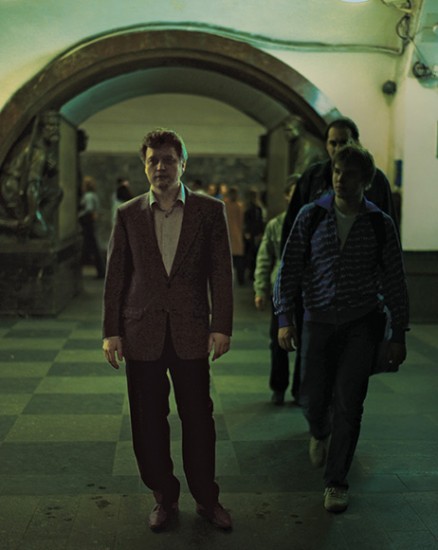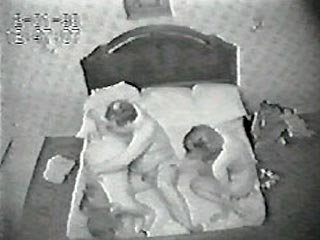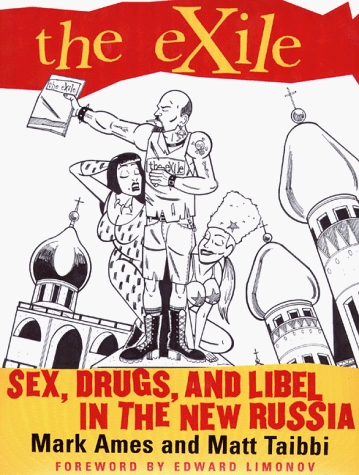
Sergei Gorshkov, the political blogger who’s in it for the money, not the politics — and isn’t afraid to say so
It was a freakishly warm February morning in Moscow, eight days before Russia’s 2008 presidential election. Green army trucks packed with bleary-eyed soldiers crawled through the city streets, a sign of a paranoid government mobilizing itself against an election-eve revolution.
But Sergey Gorshkov didn’t notice. He was hunched in his apartment, frantically trying to fix his Web site. Gorshkov publishes kompromat.ru, a scandal page that has antagonized the ruling elite since 1999 and made him one of his country’s top Internet personalities. He doesn’t write his own stories but provides links to muckraking reporters whose work would otherwise be overlooked or silenced. Over the years, Gorshkov has posted embarrassing exposè’s on some of the most powerful members of the Russian government: He linked to articles accusing Kremlin officials of funneling state money into personal offshore accounts, charging Boris Yeltsin with hiding the existence of an autistic grandson, and alleging that Vladimir Putin ordered politically motivated assassinations as director of the Federal Security Service, or FSB. That kind of indiscretion has won kompromat.ru a loyal monthly audience of more than a million Russian journalists, politicians, business types, and assorted media vultures. But it has also inspired a pattern of government harassment against Gorshkov. Since 2000, police squads have raided his ISP, customs officials have seized his laptops, and FSB thugs have made a number of surprise visits to his apartment.
Now the Kremlin was at it again. A half dozen of Russia’s largest ISPs — all with government ties — had blocked kompromat.ru. Readers who tried to access the site were redirected to a blank screen, with no explanation or error message. As a result of this sabotage, Gorshkov’s readers weren’t able to peruse his latest posts in the lead-up to the election, including many items concerning Putin’s handpicked successor to the presidency, Dmitri Medvedev — charging him with illegal use of the presidential plane for campaign purposes, or of ritually ego-browsing the morning news for mentions of his name.
The trouble from the government couldn’t have been a big surprise. Under the Putin regime, Russia’s independent media — once run by rival oligarchs who used their newspapers and TV stations to promote their own agendas and fling mud at their foes — had been nationalized or bought out by Kremlin loyalists, their editorial teams gutted and their coverage softened to toe the government line. Around election time, critical political coverage all but ceased.
And yet, at least officially, the government welcomed the unfiltered communication that the Internet promised. In China, dissident blogging can get you thrown in prison. In Russia — a petri dish of soft authoritarianism, commercialism, and shady cronyism — the rules are not so clear. Bloggers may be harassed, but Russia does not formally outlaw the online airing of antigovernment views. Indeed, a little more than a week before Gorshkov found his site blocked, Medvedev himself publicly proclaimed the virtues of a free, uncensored Internet. (He even joked about the number of fake Facebook pages set up under his name.)
But Gorshkov’s crippled Web site suggested that Medvedev’s commitment to free speech wasn’t as wholehearted as it appeared. His public pronouncements may have sounded encouraging, but in Russia vocal proponents of an independent press have a way of giving in to their own authoritarian impulses. “The government will try to enact some sort of censorship,” says Oleg Panfilov, director of the Center for Journalism in Extreme Situations, a free-speech advocacy group. “That’s just the way it is. Our government does not know any other way to act.”
The ISPs kept their blocks on the site through the election, despite Gorshkov’s threat of legal action, attributing the filtering to a technical glitch or denying it outright. On March 2, Medvedev won with 70.2 percent of the vote. The suspiciously healthy turnout rate hit 99 percent in some regions. Four days later, all but one of the ISPs dropped the block on Gorshkov’s site. Kompromat.ru was back in business.
***
Gorshkov suggests we meet at a posh Japanese spot around the corner from his palatial apartment in Moscow’s priciest neighborhood. Outside the restaurant, there’s a row of BMWs, Mercedes, and Porsches. Inside, an after-work crowd has gathered, lounging on shiny black couches, drinking, and ignoring the generic techno blaring from the speakers.
Gorshkov, dressed in a worn long-sleeved T-shirt, is thumbing a message on his Motorola phone. He looks like a younger Slavic version of Larry King. He orders a carafe of the house red and a sashimi combo plate.
It’s a swank scene, especially considering the fate of other famous Russian dissidents — author Alexander Solzhenitsyn got an eight-year stint in the gulag; Fyodor Dostoevsky was sentenced to four years of hard labor in Siberia. Gorshkov doesn’t seem to have sacrificed much, lifestyle-wise, for his work. The best estimates indicate that kompromat.ru brings in the equivalent of nearly $1 million a year. Gorshkov won’t confirm those figures, but he values his business at $15 million. “When people read my site, they imagine a person who’s angry at everything and everyone, an activist, an idealist. But that’s not me. This is just a business,” he says between bites of maguro.
And a mysterious business at that. The site carries no ads, so where does the money come from? Gorshkov admits to accepting payment to publish some of his items, offering a pay-per-post service to anyone who wants a cheap, untraceable way to smear their opponents. Gorshkov won’t discuss details, but his fee is said to run between $600 and $800 per item, depending upon the libel risk, and half of the site’s dozen or so daily posts are estimated to be zakazukha, industry slang for paid, “made to order” journalism — although it’s impossible to know which half.
Gorshkov readily defends the practice as its own form of free speech. “I never take sides,” he says. “Besides, the nature of the business is such that when one side of a conflict orders an article, their opponents inevitably respond, usually before the day is out. This way, all sides of the conflict are aired, and objectivity is maintained.”
The practice may have made Gorshkov rich, but it has not made him loved. Sergey Sokolov, a longtime rival of Gorshkov and editor in chief of FreeLance Bureau, an online investigative journalism magazine, accuses Gorshkov of sacrificing the social contract between him and his readers for the sake of a quick ruble. “His information is not reliable and always needs to be double-checked,” Sokolov says.
Gorshkov shrugs off the criticism. “A lot of people from every side are mad at me,” he says. “That’s what I have to live with.”
Gorshkov came up with the idea for the site in 1999 when Yuri Skuratov, Russia’s top prosecutor, was caught in a sex scandal. Skuratov was investigating possible corruption in the Yeltsin administration until a grainy surveillance tape, purportedly showing the prosecutor in bed with two much younger prostitutes, aired on Russian television. The investigation bogged down and was eventually forgotten.

Skuratov flashing his weenie and bald spot on national TV
Soon, a new word had edged its way into Russia’s popular lexicon: kompromat, the growing practice of using smear tactics to settle the country’s business, political, and personal disputes. “It is the same as tabloids,” says Boris Kagarlitsky, a columnist for theMoscow Times. “There was no celebrity culture, so political rumors and gossip took its place.” The country’s new appetite for scandal suggested a business opportunity to Gorshkov, a former currency trader. The financial collapse of 1998, the decline of the Yeltsin administration, the looming 2000 presidential election: There was no shortage of grist for calumny. Meanwhile, the dotcom boom had just hit Russia, and Gorshkov couldn’t wait to take part. “There were particular kompromat wars between rival factions in various media outlets, but nothing that collected all of it in one place,” Gorshkov says.
“Gorshkov was very smart. He was one of the first to figure out that you can make money off of something like this,” says Vladimir Pribylovsky, a political analyst and famous dissident writer.
The timing was perfect. Putin was elected president just months after kompromat.ru was launched, and he quickly set about clamping down on Russia’s media policy — bad for free speech, great for Gorshkov. “The greater the government control over the media, the greater the demand for kompromat,” Gorshkov says.
His big break came in April 2001, after a source handed over an unbelievable scoop: surveillance footage of someone who looked an awful lot like broadcast journalist Yevgeny Kiselev, Russia’s most respected news host, involved in an orgy. Kiselev was a Muscovite Walter Cronkite; Gorshkov knew that people would be scandalized when they saw the esteemed anchor in flagrante. The video was an obvious Kremlin leak, an attempt to crush one of the last vestiges of independent television reporting. But Gorshkov had no qualms about distributing it. He cut up the lengthy tape and posted a few of its juiciest segments — no more than 3 megabytes at the largest, so as not to overload his puny server. It didn’t help; there were so many hits, the server still crashed. Gorshkov had created a media sensation and established his site as the go-to place for kompromat.
Kompromat.ru continues to attract readers, even though it’s hardly an objective news source. In Russia, nothing is. “It is a known fact that here, many newspaper articles are written to order,” Vladimir Semago, a former deputy in the country’s parliament, tells me. “Real reporting existed for a few years in the early ’90s; it stopped as soon as journalists started dying because of it.”
That’s why even Gorshkov’s harshest critics defend his right to publish. They also laud his decision not to edit items or remove them from his archive, no matter how much pressure he receives. Pribylovsky, who runs anticompromat.ru, an anti-Gorshkov Web site, has been one of Gorshkov’s loudest detractors. Still, Pribylovsky says, in a country where most independent newspapers have been taken under Kremlin control and had their archives scrubbed of unfavorable coverage, a site containing an unedited slice of political activities is an extremely valuable resource. “I respect him and would be the first to complain if Gorshkov got shut down,” he says.
***
Gorshkov may not have been shuttered yet, but he has been the victim of several attempts. In 2006, two waves of denial-of-service attacks took the Web site offline for two weeks. There was the February 2008 shutdown. And then there are the lawsuits. Some of the biggest names in Russian politics have sued him for defamation: Sergey Mikhailov, the suspected boss of Russia’s most powerful Mafia family; Elena Baturina, the wife of Moscow’s mayor; and Oleg Deripaska, a metals tycoon and Russia’s richest man. “I have about five cases going on at any given time,” Gorshkov says. “I’ve had a total of, maybe not a hundred, but many dozens of lawsuits.”
Yet Gorshkov continues to publish. Most of the legal actions against him have been thrown out, and the ones that have succeeded have merely compelled him to remove the offending post — the only time he has taken down content. He has mirrored his site on a server located and registered in the US, effectively taking the material out of Russian jurisdiction. “If they have a problem, they can sue me in America,” he says with a smile. So far no one has. Gorshkov has also made it harder to launch a DDoS attack on his site by expanding to four servers, each hosted by a different company. The trick makes kompromat.ru more elusive; Gorshkov says it would cost about $2,000 a day to bring him down.
Nobody has tried to kill him, either. That’s remarkable considering that Gorshkov has lived through a period during which suspicious murders of muckraking journalists were — and still are — all too common. Many attribute Gorshkov’s survival to a high-powered protector, some government official or oligarch who needs kompromat.ru to slag his enemies and has put out the word that harming Gorshkov would be akin to taking down a made man.
Gorshkov insists that nobody is shielding him — and that his targets haven’t attacked him because they know he’s the conduit of information, not the writer. He is an equal-opportunity opportunist. In Russia, that’s the closest anyone comes to objectivity.
This article appears in the August ’08 issue of Wired magazine. Photo: Benedict Redgrove, Wired.com.
You can reach Yasha at levine@exiledonline.com.
Read more: compromat.ru, kompromat, Russia, russian politics, sergei gorshkov, Yasha Levine, Russia


Got something to say to us? Then send us a letter.
Want us to stick around? Donate to The eXiled.
Twitter twerps can follow us at twitter.com/exiledonline














